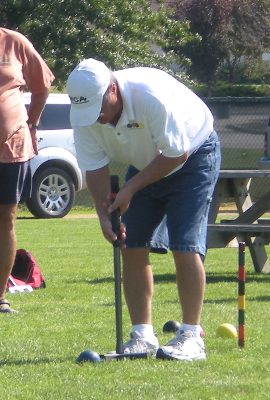Norwegian Nine-Wicket Croquet Video
Announcement: Woodranch Croquet Invitational
WoodRanch Croquet Holds Last Man Standing Tournament
Mallethead: Questions for Croquet
Start with four regions -- North America, British Isles, Africa and Oceania. Four tests -- Canada vs U.S., U.K. vs Ireland, Egypt vs South Africa, Australia vs New Zealand. The following year winners advance to final four hosted by a predetermined region winner.
Croquet Poll: What Kind Of Croquet Do You Play?
Morning Coffee: USCA Student Discount, WCF Webmaster and Arkansas Nine-Wicket
Nine to Six: Part 4 - Wiring
A Clear-Cut Difference
Wiring is pretty simple -- six-wicket has it and nine-wicket does not. Of course, if you haven't played six-wicket, you likely have no familiarity with the wiring rule. For the full details, you can check out this page on the USCA website, but the essence is that when utilizing the opponent's balls, you must leave your opponent a shot when your turn ends.
Nine to Six: Part 3 - Boundary Play
 USCA stock photo shows the string line boundaries utilized for six-wicket croquet
USCA stock photo shows the string line boundaries utilized for six-wicket croquet
A Subtle Difference
After a month off due to a very busy website schedule in November, it was time to get the Nine to Six series back on track. This month, we are looking at the boundary rules for nine-wicket and the U.S. six-wicket games. At the USCA nine-wicket national championship, option two and three of the advanced rules are utilized which effectively means that boundary rules mimic the U.S. six-wicket rules with just one subtle exception. In the nine-wicket game, a ball is considered out of bounds once it touches the line as opposed to six wicket where a ball would not be ruled out of bounds until half of the ball crosses the line.
My personal opinion is that ther are two reasons for this minor difference. First, the slower speed of the nine-wicket long grass fields means it's a little easier to roquet a boundary ball as it is less likely to roll out. Creating a smaller margin balances the lawn speed difference to a degree.
Secondly, you are more likely to see painted lines in nine-wicket as opposed to the thin string lines used in six-wicket play. From a practical standpoint, it is just much easier to judge out of bounds on a thick painted line at the moment the ball touches the line.
Again, I want to emphasize the above paragraphs are based on the rules used for advanced nine-wicket play. The base nine-wicket rules regarding boundaries are much more like Association Croquet played internationally. That means there is virtually no penalty for out of bounds and out of bounds balls are set in at 36 inches instead of the nine inches used in American rules for six-wicket and advance nine-wicket.
The Nine to Six Series (Highlighting Differences Between Nine-wicket and Six-wicket Croquet)
The Nine to Six Series (Highlighting Differences Between Nine-wicket and Six-wicket Croquet)
Part One -- Clearing Deadness
Part Two -- Post Roquet Options
Part Three -- Boundaries
Part Four -- Wiring
Part Five -- Rover Balls
More on this series: The series endeavors to describe changes that nine wicket players will encounter when they try out the U.S. rules six wicket game. There's a lot of quality information on six-wicket on the internet, but some of it seems pretty complex and is presented all at once. The aim here is to slice this into smaller concepts to allow players to absorb as needed. Also, I need to clarify that I have been playing the six-wicket game for just one-year and have not attended tournaments. So, more experienced players should feel welcome to chime in using the comments and clarify if I am leading people astray. I do think my inexperience is useful in that the concepts are fresh in my mind. Also, for players making the jump to six-wicket, I assume the basics of the game are understood.
Billy Bob Breeden Interview Excerpts
 Breeden during the 9W doubles championshipThis is a follow up to yesterday's post on George Cochran. During interviews for the November issue of the magazine, I had interesting conversations (via e-mail) with both Billy Bob Breeden and George Cochran on nine-wicket that I wasn't able to fit into the magazine story. Today I'm posting the discussion I had with Billy Bob. Here's a link to the conversation with George.
Breeden during the 9W doubles championshipThis is a follow up to yesterday's post on George Cochran. During interviews for the November issue of the magazine, I had interesting conversations (via e-mail) with both Billy Bob Breeden and George Cochran on nine-wicket that I wasn't able to fit into the magazine story. Today I'm posting the discussion I had with Billy Bob. Here's a link to the conversation with George.
Dylan: Let's start with your general impression of nine-wicket play compared to six-wicket croquet, now that you have two of these national nine-wicket tourneys under your belt.
Billy Bob: One of the things that I find harder about 9W versus 6W is the long grass. It is hard to control your breaks, but it can be done. Now on the flip side, sometimes it is hard to control your balls around the wickets on short grass whether it is 9W or 6W. Just a little hit and it may give you a tough shot on a tight wicket. I know from playing at the 9W nationals two years in a row that both years the field conditions were great for the tournament. We had a lot of break play and some of them were long breaks.
Dylan: Do you see nine-wicket as maybe being able to provide organized croquet in areas where courts are not available? In other words, is a nine-wicket club possible?
Billy Bob: Yes I do, right now there are several organized croquet club in Missouri. Just in my area, I can think of a few -- the Stanberry, Mo croquet club, they have a sand court, in the middle of their town that was built in 1973, and it is in the local park. The Chillicothe Croquet Club just plays in the local Chillicothe Park every third Sunday during the summer, I think they told me two years ago, they had been playing for 43 years, so they have had organized croquet for 45 years. The Trenton college also has a local tournament held on their campus every year. In Albany, Missouri, the local community club is trying to organize and build a court in their park. Years ago almost every little town in American had some kind of croquet being played in their local parks. Our biggest challenge is how to get our young people out of the house and onto the croquet course. I think that we all should contact organizations like local Boy Scout, Church groups, athletic directors and 4H groups and start organizing youths at an early age. Maybe even offer class in the local parks free to teach croquet.
Dylan: Wow, I had no idea there was that much croquet activity anywhere close by. Are any of those players in that region participating in the national tournament?
Billy Bob: I have tried for at least four years to get them to my tournaments. The only success was an older man from Chillicothe after I had played with them a couple of times on their sand court. He showed up for two years, but I think his age (88) was making it hard for him to hit the balls in long grass. He likes to play roquet -- an American variant of croquet played on a hard, smooth surface. There are about twelve players in Stanberry, Missouri I’ve been working on for two years, but I think the name “Nationals” scare them off. They already play both two-ball singles and doubles.
